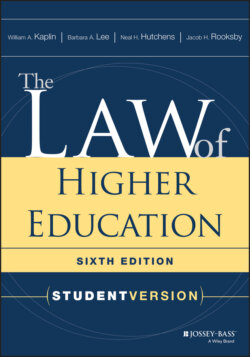Читать книгу The Law of Higher Education - William A. Kaplin - Страница 55
Notes
Оглавление1 1 Subsequent to the ruling of the trial court, the university moved for judgment notwithstanding the verdict, which the trial court awarded. While that ruling was on appeal, the student who had poured the substance on Furek agreed to pay all but $100 of the $30,000 compensatory damages award. Although the Delaware Supreme Court subsequently overturned the judgment for the university, and ordered a new trial on the apportionment of liability between the student and the university, it does not appear that Furek availed himself of the opportunity for a new trial, leaving the university responsible for only $100 of the damage award.
2 2 “10 Leading Causes of Death by Age Group—United States 2010,” Office of Statistics and Programming, National Center for Injury Prevention and Control, CDC, available at https://www.cdc.gov/injury/wisqars/pdf/10lcid_all_deaths_by_age_group_2010-a.pdf.
3 3 See http://www.suicide.org/college-student-suicide.html.
4 4 Center for Collegiate Mental Health. (2017, January). 2016 Annual Report (Publication No. STA 17-74). See also Katie Reilly, “Record Numbers of Students Are Seeking Treatment for Depression and Anxiety—But Schools Can't Keep Up.” Time, March 18, 2018, available at http://time.com/5190291/anxiety-depression-college-university-students/.
5 5 This decision reverses and remands a summary judgment in favor of the university by the trial court. In a second opinion in this case, 547 P.2d 1015 (1976), the court reaffirmed (without discussion) the portion of its first opinion dealing with authorization.
6 6 Not all courts will be so willing to find institutional authority in cases concerning public institutions. Other courts in other circumstances may assert that a person who deals with a public institution “does so at his peril,” as in First Equity Corp. of Florida v. Utah State University, 544 P.2d 887 (Utah 1975), where the court upheld the university's refusal to pay for stocks ordered by one of its employees.
7 7 In addition to federal constitutional rights, there are numerous federal statutes that create statutory civil rights, violation of which will also subject institutions to liability. These statutory rights are enforced under the statutes that create them, rather than under Section 1983. Institutions may also be liable for violations of state constitutional rights, which are enforced under state law rather than Section 1983.
8 8 State employees and officials may be sued in either their “official” capacities or their “personal” (or “individual”) capacities under Section 1983. For the distinction between the two capacities, see Hafer v. Melo, 502 U.S. 21, 25–31 (1991). Since lawsuits seeking money damages against employees or officers in their “official” capacities are generally considered to be covered by a state's Eleventh Amendment immunity, such suits are discussed in this section of the book.
